In today’s information age, where information is flooding and technology is evolving rapidly, the emergence of data-driven marketing strategies stands as a beacon of innovation and opportunity.
Therefore, the importance for data-driven marketing strategies cannot be overemphasized. This is crucial for EdTech companies as most learning institutions are shifting to the digital world. Everyone is now looking for their niche in the digital world, and this is where the need for a data-driven marketing strategy comes in.
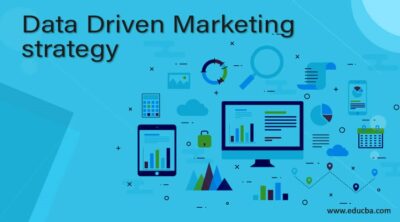
Do you want to stand out from this competitive and crowded market? Implementing data-driven marketing strategies will help you achieve precisely what leads you to find your place in such a market.
This article covers the meaning of data-driven marketing, what it entails, why it is paramount for EdTech companies to implement it, and how it can reshape the industry. Further, we will also look into the various approaches to data-driven marketing.
This includes a brief outline of differences, from traditional marketing methods to implementation strategies, and the capability to inform marketing decisions and enhance campaign performance.
What is Data-Driven Marketing?
Data-driven marketing is a marketing approach where marketers develop strategies that rely on analyzing large volumes of data. By optimizing data analytics tools and techniques, EdTech companies can study customer behavior, trends and preferences with unparalleled accuracy. This enables them to come up with well-versed decisions and personalized marketing efforts that significantly enhance campaign performance.
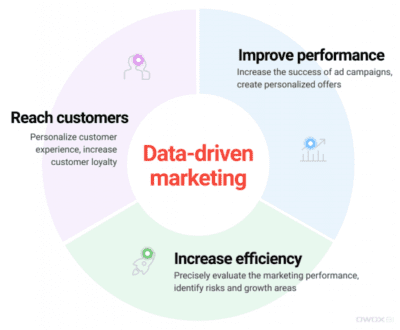
For edtech companies to meet their needs, it’s vital for them to learn and understand them first.
Why EdTech Companies Need to Implement Data-Driven Marketing Strategies:
According to Statista, the marketing of online learning platforms in Kenya, for example, is estimated to generate a revenue of US$68.36m in 2024, as most people are eagerly embracing digital education. The need to have a space in the digital world surges, leading to increased demand for online marketing.
Thus, implementing data-driven marketing strategies becomes necessary for any EdTech company. In such a crowded market, the skill to differentiate oneself and offer targeted, personalized experiences to users can be an outstanding competitive advantage.
Moreover, the education industry constantly evolves with new technologies, teaching methods and learning preferences. As an EdTech company, you can use data-driven marketing strategies in this context to your benefit and stay ahead of the changes.
You could analyze data on user behaviour, engagement patterns and preferences to understand your target audience better, enabling you to meet their evolving needs effectively and offer relevant content.
Data-Driven Marketing vs. Traditional Marketing
Traditional marketing is basically any marketing activity done offline to reach an audience. Traditional marketing approaches, such as mass advertising and broad demographic targeting, are often formulated based on intuition and general assumptions rather than concrete data.
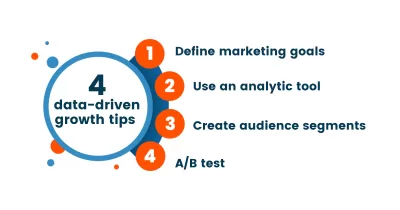
Traditional marketing is rarely based on a thorough study conducted and analyzed. The study can be manually tiring to conduct, such as an analysis of a big population. While these methods may have been influential in the past, they need to be updated in today’s digital world. On the other hand, data-driven marketing relies on empirical evidence and real-time data analysis to inform decision-making.
A significant difference between data-driven marketing strategies and traditional marketing for EdTech is the level of personalization and targeting it enables. Traditional marketing campaigns often target broad demographics or geographic regions, whereas data-driven marketing allows for highly targeted, personalized campaigns based on individual preferences, behaviour, and interests.
This increases the effectiveness of marketing efforts and enhances the overall customer experience. The customer feels more seen and understood with a personalized experience.
All in all, just because digital marketing approaches have outdated the traditional ones does not mean traditional approaches are completely purposeless. You can incorporate them together to help you reach a more expansive and diverse audience.
Most parents still read newspapers and watch local shows; as an EdTech company, you can use data-driven marketing approaches to give you a better analysis and then apply it to that traditional approach you wish to use to provide a more effective result.
Benefits of Data-Driven Marketing Strategies
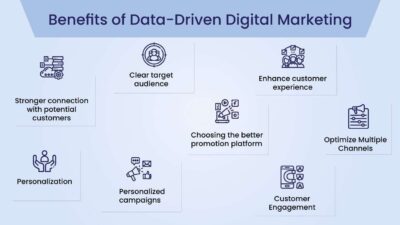
Data-driven marketing is the starting point of today’s advertising strategies, as it is very important to know your target audience before marketing your product or service to them. As an EdTech company, if you’re looking to stand out in this highly competitive field, implementing data-driven marketing strategies to your marketing strategies will be a game changer. Let’s look at some of the benefits it brings to the company:
- Better understanding of the Target Audience and Personalized Experiences.
You can better comprehend your customers’ preferences, behaviours, and needs by analyzing their data from diverse sources such as your social media platforms, customer reviews, CRM systems, and many more. These findings can help your EdTech company develop more effective data-driven marketing strategies and campaigns. The EdTech company can also use these insights to deliver a more personalized experience that is tailored to their customer’s learning preferences, styles and goals, enhancing customer satisfaction.
- Improved User Engagement
EdTech companies can leverage data-driven marketing to form a more individualized connection with their audiences at a scale. Data-driven marketing will enable EdTech companies to engage with users across multiple channels such as websites, emails and social media. By studying and analyzing the users, you can offer tailored experiences and messages to individual customers, building stronger relationships and brand loyalty.

- Better Content and Curriculum Development
Conducting data analysis can help EdTech companies come up with helpful knowledge about which type of content, learning methods and materials are the most effective in driving engagement and learning outcomes. These insights allow you to optimize your content and curriculum development to diligently meet your clients’ needs. In addition, it can help EdTech companies discover the marketing channels that are the most effective and the best fit for reaching and engaging with their clients.
- Enhance Company Performance
Implementing data-driven strategies in marketing can also help EdTech companies drive more revenue to their business. By leveraging advanced analytics, the company can come up with more informed decisions that lead to increased revenue and business growth.
It can also help them allocate resources more effectively to achieve optimal results with their marketing efforts, leading to an increased ROI. By continuously analyzing data and refining their strategies, EdTech companies can drive continued business success and stay ahead of the competition in the constantly growing field of education technology market.
Implementing Data-Driven Marketing
Implementing data-driven marketing strategies in your EdTech company requires combining technology, expertise and a data-driven culture within the organization. Some of the essential steps to implementing data-driven marketing in the EdTech company include:
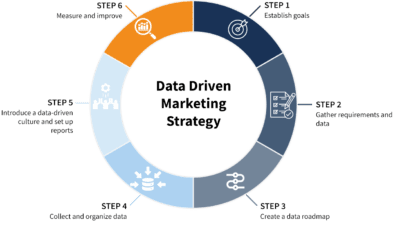
- Establish Goals: Before implementing any data-driven marketing strategies, it is essential for the organization first to identify its goals and use cases. You must have goals to have a successful marketing campaign. Depending on the objectives of your EdTech company, you ought to establish the goals you want to achieve from data-driven marketing. For instance, you could be new to the market, so your goal could be to understand your target audience better to help you make more informed decisions for your marketing strategies.
- Data Collection and Integration: after you have established your goals and analyzed them, you can now start to collect data from various available sources such as social media platforms, customer relationship management (CRM) systems, website analytics and marketing automation tools. The next step is where the data is integrated into a centralized database for analysis.
- Data Analysis and Insights: Once you’ve established your goals, analyzed them, and then collected your data, your next step is now to analyze the data collected to uncover valuable insights. Analyzing the data involves using data visualization tools, statistical analysis techniques and machine learning algorithms to pinpoint patterns, trends, and correlations in the data.
- Segmentation and Personalization: Based on the findings you get from the data analysis process, EdTech companies can segment their audience into smaller, more targeted groups. You can segment the customers based on their behaviours, preferences and demographics, allowing for more personalized marketing strategies and offers that resonate with specific segments of the audience. Also, data about your target audience can help you be aware of the issues and their pain points, opening your Edtech company to an excellent opportunity to address them.
- Optimization and Testing: With data-driven marketing, you don’t do it once and then stop. It is a repetitive process requiring your company to continuously enhance and test it. The data is constantly changing, so your company should monitor the performance of its marketing campaigns, experiment with different strategies and tactics, and adjust your plan based on the results.
How Can EdTech Companies Harness Data Analytics for Marketing Decisions?

Besides implementing data-driven marketing strategies, EdTech companies can explicitly harness data analytics to inform marketing decisions and improve campaign performance. Some of the key areas that data analytics can impact include:
- Tracking user behaviour: By monitoring metrics such as website visits, page views, time spent on the site, and click-through rates, EdTech companies can gain insights into how users interact with their platforms and content. You can learn which platform and content brings more engagement and traction. This understanding allows you to tailor your marketing content and campaigns to align with your audience better.
- Measuring ROI: Measuring the return on investment (ROI) of data-driven marketing strategies is essential for assessing their success and bettering upcoming strategies. Some EdTech companies can use the EdTech ROI scorecard developed by EdSurge to evaluate the ROI of EdTech investments. The EdTech scorecard shows the effectiveness of EdTech explications and its impact on the student’s outcome. You can use data analytics tools like the data box to track key performance indicators (KPIs) such as customer acquisition cost (CAC), customer lifetime value (CLV), and conversion rates to calculate ROI accurately.
- Refining your Marketing Strategies: Data-driven marketing strategies can help EdTech companies refine their marketing strategies for better outcomes. For example, your company can analyze the performance of the various marketing channels you use to help you formulate informed decisions regarding allocating time, resources, and finances more effectively and invest in channels that yield the highest returns.
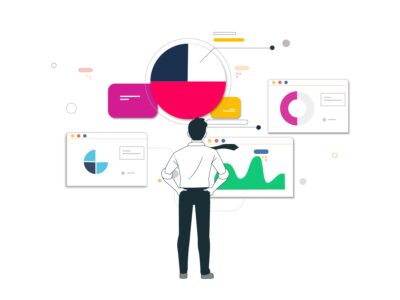
Conclusion
In conclusion, data-driven marketing strategies are essential for EdTech companies looking to drive growth and stay competitive in today’s digital age. As the EdTech industry continues to grow, implementing data-driven marketing strategies becomes an obligation if the company wants to increase its market share.
By optimizing data analytics to learn user behaviour, come up with informed decisions, and measure ROI, EdTech companies can create segmented and effective marketing campaigns that speak to their target audience and drive massive impact on their business.
